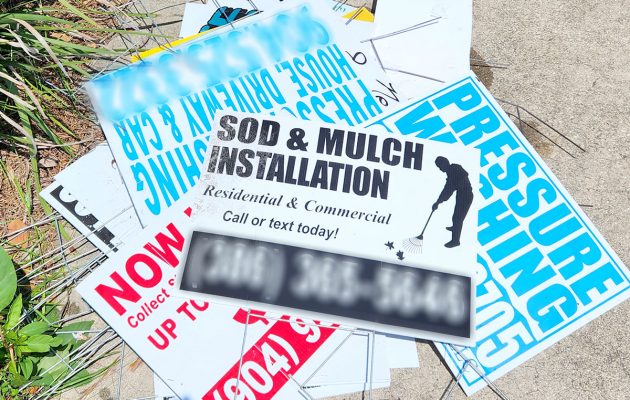Taking aim at snipe signs

They’re a common sight at the base of highway off-ramps or waiting to greet drivers as they leave residential communities — or even popping up at busy intersections.
Sticking up from the ground or affixed to or utility poles, they often boast promises to buy houses or cars, offer services to repair roofs, trim trees or cut lawns.
They’re snipe signs and yes, they’re illegal.
A snipe sign, according to the City of Jacksonville, is defined as “a sign placed on public property or within the public right-of-way. These signs are unlawful, considered abandoned property, and enforceable by immediate fine under local ordinance Chapter 741 [“Zero Tolerance on Litter”].”
The only exceptions to the law are “signs erected and maintained pursuant to the discharge of the governmental function of public health and safety,” — for example, the “vote here” signs directing citizens to polling sites or those, during the pandemic, directing residents to COVID-19 testing sites.
All other signage, if erected or affixed on public property or public right-of-way, is not permitted.
“Snipe signs are another component of obtrusive signage that really can be considered litter in some ways,” explained Scenic Jacksonville Executive Director Nancy Powell. “…Citizens should know that they are able to pick up a snipe sign that is illegal.”
Snipe sign complaints can be submitted to the City through various channels, including calling 630-CITY, the MyJax app and/or e-mail address or “or notifying an agency that can create a complaint on your behalf,” according to the City.
Enforcement of Chapter 741’s “zero-tolerance policy” when it comes to snipe signs includes fines and confiscation of the sign(s) in question. An immediate $50 fine is issued for the first five signs each on a single property by the same violator; additional signs beyond those first five receive a fine of $150 each.
The City explained:
“Uncontested citations and repeat offense violators progress the fine schedule from the first offense of $50-$150, to the second offense of $300, and the third offense of $500 per sign. Any unpaid citation may be issued a $500 judgement by the court, plus court fees. Contested signs may received a civil fine up to $500 plus court and attorneys’ fees. Any sign attached to a public utility pole, where the sign is above five feet from the ground, will start with the first offense at $350 per sign plus court fees.”
These fines are paid to the Duval County Tax Collector’s office and are then deposited into the litter trust fund account. These funds are distributed as follows (pursuant to ordinance section 111.786): “70% to [the Jacksonville Transit Authority] for bus stops and bus shelter maintenance; 30% to the enforcement and public awareness of the litter sign ordinance.”
In 2022, the City of Jacksonville collected $82,600 in litter sign fines; so far in 2023, it has collected $65,620.
Powell added that while citizens are able to remove illegal snipe signs and report them, the community shouldn’t rely on its community members to address this litter.
“We have the laws on the books, it’s a question of are we going to enforce those and make it a priority from a higher level perspective,” she said.
Political signs are permitted on private property so long as they are set back more than 10 feet from public right-of-way. According to city ordinances (Section 646.1314), “one temporary election sign for each candidate and each ballot issue may be displayed on a private lot.”
These signs must be removed within one week following “the election to which it pertains.”
Political signs or advertisement is not permitted on public property.
According to the city code, temporary directional real estate signs — “a temporary nonilluminated sign that functions to provide directions to residential real estate that is for sale, rent, or lease…” — is permitted on weekends from 6 p.m. Friday to 6 p.m. Sunday, though it must meet other criteria set out by the code pertaining to size, height and width and must follow specifications regarding authorized placement locations.
The code outlines these authorized locations to include:
“The non-paved portion of the public right of way of any City of Jacksonville roadway that is situated outside of any sidewalk, ditch or drainway;
Private property with the permission or consent of property owner or lawful occupant of the property; and
Within locally designated historic districts on the locations set forth in Subsections 656.1313(c)(1) and (2), provided that there shall be no more than three signs permitted for each residential property for sale, rent or lease within such districts.”
Signs on private property are permitted, though the building code requires permits are for all signs. Residents interested in learning more about the city’s rules and regulations regarding signs can do so by reading Part 13 (“Sign Regulations”) of Chapter 656 of the city’s Zoning Code.
By Michele Leivas
Resident Community News






